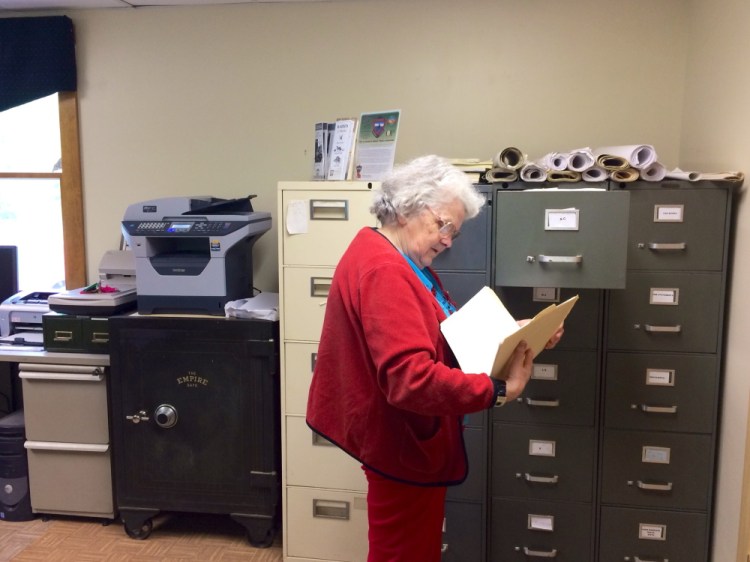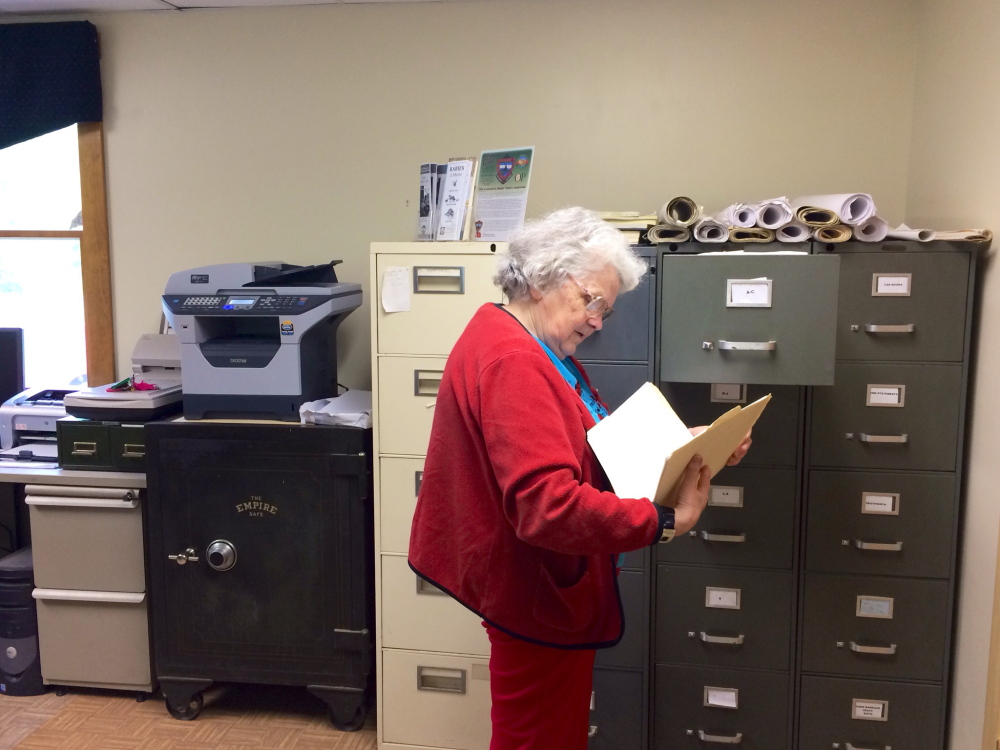NEW VINEYARD — Longtime administrative assistant Arlene Davis is resigning from her job at the Town Office, saying selectmen wouldn’t give her a contract, reduced her hours and asked her to take on extra work in the last few months.
The incident also is sparking broader questions about municipal government in this rural Franklin County town of about 750 residents, with disclosures that selectmen might have held an illegal meeting when they met with Davis and have not been keeping meeting minutes as required by state law.
Davis, 79, said her health was questioned by board members, and they didn’t tell her that her lack of computer skills would hurt her hours and pay.
“I never had trouble with them signing a contract before,” said Davis, who has worked at the Town Office for more than 45 years. “I don’t know why the decision was made to go this route.”
Davis said she feels as though she was forced to resign based on the comments from board members.
As administrative assistant, Davis is appointed by the board to serve as tax collector, town clerk and treasurer. The town Administrative Assistant Ordinance stipulates that the assistant works under a contract that ensures vacation time and personal days and states a rate of pay and number of hours to be worked each week.
According to the ordinance, the contract is for one year and should be renewed each year after the annual Town Meeting in March. Town records show copies of signed contracts dating back to the early 1990s, but there isn’t one for this year. That’s because the Board of Selectmen refused to sign a current contract in March, according to Davis.
“I said, ‘I’m working without a contract,’ and they said, ‘Well we’re not going to have you work with a contract this year,'” Davis said.
Fay Adams, the board chairwoman, said the board didn’t think a contract was necessary and said she wasn’t aware of the ordinance, passed in 1988, requiring one. Adams and Davis are also related; they’re first cousins.
The Morning Sentinel acquired a copy of the ordinance Tuesday at the Town Office. It states that the administrative assistant “shall be appointed for a definite term specified by contract,” and implies that the contract should last at least one year, “to end Annual Town Meeting day following the meeting.”
Niilo Sillanpaa, another member of the three-person board, said the board didn’t refuse to sign a contract but was in the process of negotiating with Davis and discussing what he described as “inefficiencies” in her performance.
Frank Forster, the board’s third selectmen, couldn’t be reached for comment.
Exactly what transpired is hard to determine, though, since selectmen don’t keep consistent meeting minutes, in apparent violation of state law. They also didn’t record negotiations with Davis, a town employee whose job status should have been worked out in public meetings.
Davis, who originally wrote a letter to the Morning Sentinel announcing her resignation and then agreed to interviews, said she was pressured to resign finally after months of working without a contract. The board, though, says her claims of mistreatment are unsubstantiated.
Meanwhile, the incident is raising questions about whether the board has been violating not only a local ordinance but also state open-records laws. Davis, who is one of just two employees in the Town Office, said there are no minutes from selectmen’s meetings at the office for meetings after October 2014.
“There are a lot of small towns in Maine, and they can do business somewhat informally at times,” said Sigmund Schutz, a Portland attorney representing the Morning Sentinel. “They may not have a lot of staff support to arrange and advertise meetings at times, but they still have to comply with the (Freedom of Access) Act. There’s not a lot of gray around this; the requirements are pretty clear.”
LONGTIME EMPLOYEE
Davis had served as a town employee for more than 45 years, beginning in 1969. She worked out of her home then, and she said she thought nothing of getting up in the middle of supper to file a fishing license for a resident.
In 1988, she began working in the Town Office after the town adopted the administrative assistant ordinance.
She worked 24 hours per week until four years ago, when the board created a deputy administrative assistant position to serve as Davis’ assistant. At the same time, Davis’ hours were reduced to 20 hours per week, as the new assistant was expected to take over work on the computer, something Davis said she has never wanted to learn to do.
Davis said she didn’t mind the cutback in hours and understood that it was related to the need for more computer work. In the summer of 2014, the town hired a new deputy assistant. The woman, whom the town refused to identify by full name, was brought in at 20 hours per week; but her hours were reduced later.
In March, Davis’ contract expired and she wrote up a new one for the selectmen to sign. She listed the number of hours to work at 20 per week, the same amount she had worked for the last three years, but the selectmen never signed the contract.
Adams said the board thought Davis no longer was needed for 20 hours per week, but Davis said that was never communicated to her.
Despite the lack of a contract, conditions of the job and what was expected were discussed with Davis “right face-to-face,” Adams said, though the selectwoman conceded it “apparently should have been in writing.” She said the board reduced Davis’ hours from 20 per week to 16, but she wasn’t sure when the change was made.
That and other changes in Davis’ duties weren’t discussed at a regular meeting but by individual selectmen who spoke with Davis “off the beaten path,” according to Adams.
Davis said all three selectmen spoke to her in an informal meeting. Sillanpaa said the hours and other changes were brought up in a regular selectmen’s meeting, but said there are no minutes documenting the meeting.
“We don’t keep minutes at every meeting,” Sillanpaa said. “Sometimes we aren’t doing anything. If there are no minutes from that meeting, it’s because Arlene was being ugly with us.”
Adams also stated that minutes are not kept regularly at selectmen’s meetings. She said the board “sometimes takes them and sometimes doesn’t.”
LAW REQUIREMENTS
State law requires municipalities to keep a record of public meeting proceedings, including selectmen’s meetings. The state’s Freedom of Access Act states that public government proceedings must be made available and list at the very least the time, date and place of the meeting; members of the board who are present; and all motions and votes taken.
Under that standard, the board apparently hasn’t been keeping meeting records, contrary to what the law requires, and also apparently changed Davis’ job requirements without properly convening a meeting to take such action.
“Certainly the performance, job requirements or compensation of a town employee are public business; and that can only be discussed by the board at a lawfully noticed public meeting,” said Schutz, the Portland attorney. He said residents have a right to be informed about how town money is being spent and the operations of the Town Office.
Once a meeting has been called to order, the board can make a motion and vote on going into executive session if the subject matter requires them to discuss it in private, Schutz said. Discussing an employee’s job performance usually would fit that criteria.
“It is permissible to discuss some personnel issues in executive session, but not all,” Schutz said. “One of the key requirements is that if they’re going to discuss a personnel matter, the executive session can only be held if the discussion would reasonably be expected to damage that person’s reputation or violate their right to privacy.”
Job requirements and even compensation are not valid requirements for calling an executive session, according to Schutz, although a critique of a person’s performance might be.
Eric Conrad, a spokesman for the Maine Municipal Association, the group representing Maine towns and cities, said that while he could not comment on the specifics of the New Vineyard situation, boards of selectmen are required to keep meeting minutes.
When it came time for Davis’ contract to be renewed in March, she wrote in 20 hours per week, the same as she has worked the last three years.
The board thought Davis was not needed in the office 20 hours per week, but she said she wasn’t told that. She said she wasn’t given a reason for the board members’ refusal to sign the contract until early April, when they asked her to speak with them informally. According to Maine’s Freedom of Access Act, public notice must be given for any meeting involving a government body of three or more people, which would have included the meeting with Davis.
Neither Davis nor board members could recall the exact date of the meeting in April.
“They just asked me to come in and talk to them, and that’s when they brought these things up,” Davis said. “It was not an official meeting; it was just they wanted me to come talk. They didn’t take any notes, and they don’t want anyone to know what they talked to me about.”
At the meeting, board members told Davis they wanted to cut her hours from 20 per week to 16 — a loss of about $60 per week in pay — but also asked her to take on additional duties, she said.
In January, Davis had stopped processing concealed weapons permits because of the amount of time required. She said she didn’t have time to do the permits after her hours were also reduced in 2011, and she was surprised when the board asked her to resume the duty while also reducing her hours.
“I felt like they were hanging that over my head,” Davis said.
Another board member also brought up Davis’ glaucoma and osteoarthritis, asking her what she would do if she didn’t have the job, she said.
“My health doesn’t have anything to do with me doing my job,” Davis said. “Yes, I have a limit of how much work I can do at a time, but it’s a sit-down job. I don’t take medicine or anything to get me by. I get by fine.”
Adams and Sillanpaa said board members did not bring up Davis’ health. “We have been really, really careful not to mention her age or her health. We would have no reason to do that,” Adams said.
Both board members said Davis’s computer skills were a big issue.
“There was work on the computer that Arlene couldn’t provide,” Adams said. “Copies of tax bills, updating the interest and that type of thing; but I don’t know how serious that was.”
But she added, “We never mentioned it to her.”
Sillanpaa, too, said Davis’ computer skills never were discussed because it was well known that she did not want to learn. “She knows,” he said, “and she refuses to get the computer training.”
RESIGNATION DECISION
Davis submitted a letter of resignation to the board in early May after talking it over with her family.
Her last day of work is Friday, July 3.
According to Sillanpaa, the board tried to work with Davis to get her to stay at the job even after she submitted the letter of resignation.
“We haven’t been badgering her,” he said. “She would not work with us when we tried to give her the hours, but were going to add things on that the town needed.”
Davis, in a letter she originally submitted to the Morning Sentinel, stated that it is “the hardest letter I have ever written.” Davis wrote she is resigning her position because “I can no longer work under this Board of Selectmen for the disrespectful way they have treated me over the past few months and some of the decisions they have made concerning my job description.”
“I have always worked diligently and have enjoyed my work up until a few weeks ago,” she wrote. “I have put in many extra hours at my home, never charging the town for them when they were needed to complete reports.”
Davis said she saw a lawyer in Farmington, who reviewed the town ordinance and old contracts, then referred her to another attorney in Augusta who he said had more knowledge of contract law. She said the town attorney told her he couldn’t talk to her because he is employed by the board and it would present a conflict.
Not wanting to spend the money and time, Davis said she decided not to go to Augusta.
Davis said she told the deputy assistant, who has been in the Town Office for only a year, that she feels bad about leaving and would have stayed longer. But Davis said she was treated unfairly.
“They expect me to do my job and do extra work, and this is what’s happening — they’re not doing theirs,” she said. “It’s one of the reasons I’m just not going to take it any longer.”
Rachel Ohm — 612-2368
Twitter: @rachel_ohm
Send questions/comments to the editors.







Success. Please wait for the page to reload. If the page does not reload within 5 seconds, please refresh the page.
Enter your email and password to access comments.
Hi, to comment on stories you must . This profile is in addition to your subscription and website login.
Already have a commenting profile? .
Invalid username/password.
Please check your email to confirm and complete your registration.
Only subscribers are eligible to post comments. Please subscribe or login first for digital access. Here’s why.
Use the form below to reset your password. When you've submitted your account email, we will send an email with a reset code.